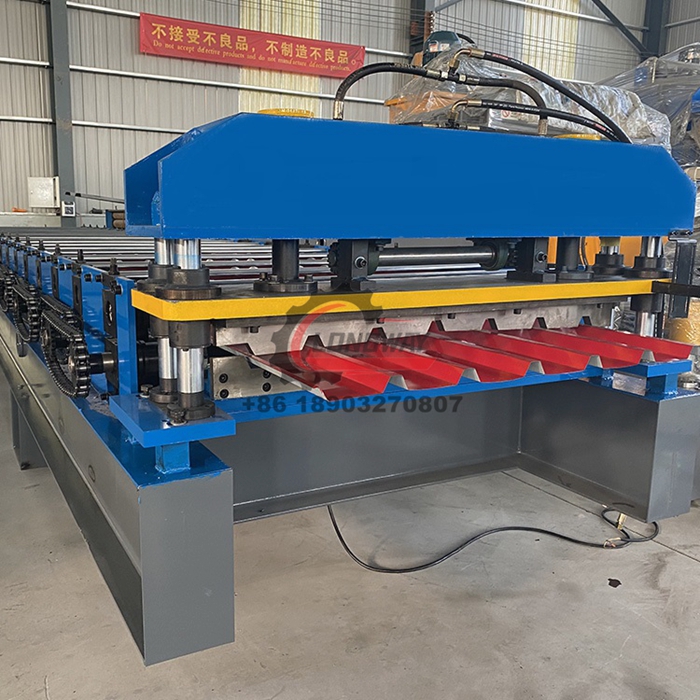metal roll forming systems factory
Metal Roll Forming Systems A Comprehensive Overview of Factory Operations
The manufacturing landscape has always been characterized by innovation and technological advancement. Among the myriad of manufacturing processes, metal roll forming stands out as one of the most efficient and versatile techniques for producing a wide range of metal profiles. This technique, often employed by factories specializing in metalworking, has gained immense popularity due to its ability to create complex shapes with precision and speed.
Understanding Metal Roll Forming
Metal roll forming is a continuous bending operation in which a long strip of metal is gradually shaped into a desired profile by passing it through a series of rollers. Each roller is specifically designed to incrementally bend the metal, ultimately creating a uniform cross-section. This process is frequently used for manufacturing products such as metal roofing, siding, and automotive components, as well as a variety of structural applications.
The raw materials typically utilized in roll forming include steel, aluminum, and other metals that can withstand the necessary forming pressures without fracture or deformity. The selection of material depends on the application's requirements, such as strength, weight, and resistance to corrosion.
Factory Operations
A metal roll forming factory is equipped with advanced machinery tailored to the nuances of the roll forming process. Key elements of this setup include
1. Material Handling Systems Efficient material handling is crucial in a roll forming factory. Equipment such as cranes, conveyors, and forklifts ensure the smooth movement of raw materials into the production line and finished products out of the facility.
2. Roll Forming Machines The heart of the operation lies in the roll forming machines. These machines feature multiple stations, each equipped with rollers that progressively shape the metal strip. Modern roll forming machines often come with advanced controls for precision and are capable of handling various metal thicknesses and widths.
metal roll forming systems factory

3. Cut-off Systems Once the metal has been formed into the desired shape, it needs to be cut to specific lengths. Cut-off systems can be integrated into the roll forming line to ensure consistent measurements and high-speed cutting, minimizing waste and increasing productivity.
4. Quality Control Quality assurance is vital in metal fabrication. Factories implement strict quality control measures, including visual inspections and dimensional checks throughout the production process to ensure that the final products meet industry standards.
5. Finishing Processes Depending on the end use, the finished metal profiles may require additional treatments such as coating, painting, or galvanizing. These processes help enhance the product’s durability and aesthetic appeal.
Benefits of Metal Roll Forming
The advantages of metal roll forming systems are numerous. Firstly, the process is highly efficient, leading to rapid production cycles and reduced labor costs. Roll forming also generates minimal waste, as the material is shaped continuously without the need for cutting blanks, which is common in other manufacturing methods.
Moreover, the capability to produce complex shapes with precision allows for greater design flexibility, making roll-formed products ideal for various industries. Additionally, the consistent quality of roll-formed products ensures that manufacturers meet the high standards demanded by their clients.
Conclusion
As industries continue to evolve, the relevance of metal roll forming systems in manufacturing remains steadfast. By streamlining production processes and enhancing product capabilities, these systems offer a compelling solution for modern manufacturing challenges. With advancements in technology, the efficiency and precision of metal roll forming are anticipated to improve further, ensuring that factories equipped with these systems are well-positioned to meet the future demands of the market.
In a world where customization and efficiency are paramount, metal roll forming systems embody the innovation required to thrive in the competitive landscape of modern manufacturing. As factories adopt and adapt these technologies, the versatility and effectiveness of roll forming will undoubtedly play a critical role in shaping the future of metal fabrication.
-
Roof Panel Machines: Buying Guide, Types, and PricingNewsJul.04, 2025
-
Purlin Machines: Types, Features, and Pricing GuideNewsJul.04, 2025
-
Metal Embossing Machines: Types, Applications, and Buying GuideNewsJul.04, 2025
-
Gutter Machines: Features, Types, and Cost BreakdownNewsJul.04, 2025
-
Cut to Length Line: Overview, Equipment, and Buying GuideNewsJul.04, 2025
-
Auto Stacker: Features, Applications, and Cost BreakdownNewsJul.04, 2025
-
Top Drywall Profile Machine Models for SaleNewsJun.05, 2025








